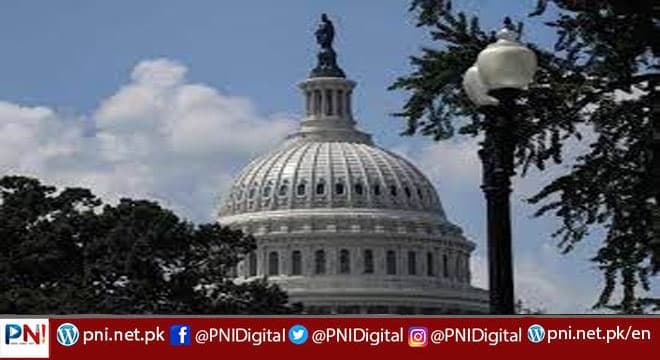Washington, Oct 29 (AFP/APP):US lawmakers are heading into the holiday season after one of the busiest legislative periods in years, with President Joe Biden having failed so far to coalesce Democrats around make-or-break spending bills that he hopes will improve his sagging approval ratings.
Facing stinging criticism over a lack of progress on his sweeping economic agenda and disappointment over child care, drug pricing and climate reforms he has been forced to drop by his own party, the 78-year-old veteran negotiator is banking on shaking an inert Congress out of its torpor well before next year’s midterm elections.
Avoiding a government shutdown is also at the top of the agenda, alongside dodging a potentially catastrophic credit default, the most crucial of the looming deadlines.
– Build Back Better –
Democrats are hoping to secure a sweeping $1.75 trillion social policy package through a process known as reconciliation, meaning the bill can pass with a simple majority in the evenly divided 100-member Senate.
The “Build Back Better” plan — which aims to tackle climate change, lower child care and education costs and create millions of jobs — has been characterized by Biden as a moment that could “change the trajectory of our country for years or decades to come.”
Republicans are unsurprisingly dismissing the proposals as an example of out-of-control tax-and-spend politics, but the real battle is playing out between moderate and progressive Democrats.
Worried about inflation and the national debt, the party’s most conservative lawmakers opposed an original $3.5 trillion ticket price and have spent months chiseling the figure down.
That angered liberals, who saw priorities such as paid family leave and expanded health care axed alongside plans to cover much of the expense with a new billionaires’ tax.
But they have promised to roll with the punches and take what they can get, announcing they would green light the legislation and soon as their moderate rivals are on board.
That would pave the way for a vote as early as next week or perhaps mid-November, depending on how long it takes for a final legislative text to emerge.
– Infrastructure –
A $1.2 trillion infrastructure bill passed the Senate in August with the support of one-third of the Republicans in addition to all 50 Democrats.
The popular package includes $500 billion in new federal spending on roads, bridges, transportation, high-speed internet and climate change measures, including extreme weather resilience and a network of charging stations for electric cars.
Democratic Speaker Nancy Pelosi first promised to sync up the House of Representatives by September 27 but had to scratch that vote and announce a series of subsequent delays, amid infighting among the majority party.
This legislation ought not to be controversial, as politicians of all stripes like to go back to their districts with pledges of cash for crumbling roads and bridges.
But here too, the real fight is internal, with Democratic progressives saying they won’t vote for infrastructure until the larger social spending package is squared away.
Progressives have said they want to pass this bill at the same time as Build Back Better.
– Debt ceiling and shutdown –
The US debt ceiling must be extended by December 3 to avoid a default, which would trigger economic collapse and roil financial markets worldwide.
Treasury Secretary Janet Yellen has warned of “irreparable damage to the US economy” if the issue is not settled comfortably in advance of the deadline.
Democrats usually join with Republicans to suspend the debt limit and did so most recently in August 2019, under Donald Trump’s administration.
Lawmakers will also have to approve a new budget by that same all-important date to avoid a government shutdown — when financing for federal agencies dries up and they can no longer function.
Republicans have pledged to withhold their votes on any debt ceiling package.
They argue that Pelosi and her Senate counterpart Chuck Schumer should have addressed the debt limit in the Build Back Better package, because it doesn’t require Republican support.
Republicans have suggested that Biden’s policies have created the need for the debt limit increase.
An analysis of Treasury Department data shows however that Republicans accrued $7.8 trillion in new debt during the Trump administration — more than a quarter of the total — in just four years.
The country has added a fraction of that since Biden’s inauguration on January 20.
Follow the PNI Facebook page for the latest news and updates.








